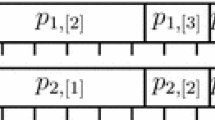Abstract
We consider the problem of minimizing the makespan in open shop scheduling. The decision problem whether a given sequence in open shop scheduling is irreducible has already been considered, however, has not been solved yet. A sequence is an acyclic orientation of the Hamming graph K n ×K m . Irreducible sequences in open shop are the local optimal elements. We present two variants of algorithms based on the specific properties of the H-comparability graph. The first is polynomial whereas the second is exponential. The irreducibility is co-NP. The stated properties argue whether it belongs to P. The complexity status of the considered decision problem is updated.










Similar content being viewed by others
References
Andresen, M. (2009). On the complexity of reducibility problems through H-comparability graphs. PhD thesis. University of Magdeburg, Germany (in German).
Andresen, M., Bräsel, H., Plauschin, M., & Werner, F. (2008). Using simulated annealing for open shop scheduling with sum criteria. In Global optimization: focus on simulated annealing, I—techonline (pp. 49–76).
Bräsel, H., Harborth, M., & Willenius, P. (2001). Isomorphism for digraphs and sequences of shop scheduling problems. JCMCC. Journal of Combinatorial Mathematics and Combinatorial Computing, 37, 115–128.
Bräsel, H., Harborth, M., Tautenhahn, T., & Willenius, P. (1999). On the set of solutions of an open shop problem. Annals of Operations Research, 92, 241–263.
Bräsel, H., & Kleinau, M. (1996). New steps in the amazing world of sequences and schedules. Mathematical and Computer Modelling, 43, 195–214.
Dhamala, T. N. (2010). On the status of irreducibility problems of open shop sequencing problems. Nepal Journal of Science and Technology, 11, 205–214.
Dhamala, T. N. (2007). On the potentially optimal solutions of classical shop scheduling problems. International Journal of Operations Research, 4, 1–10.
Golumbic, M. C. (2004). Annals of discrete mathematics: Vol. 57. Algorithmic graph theory and perfect graphs, 2nd ed. Elsevier, Amsterdam.
Golumbic, M. C. (1977). Comparability graphs and a new matroid. Journal of Combinatorial Theory, Series B, 22, 68–90.
Gonzalez, T., & Sahni, S. (1976). Open shop scheduling to minimize finish time. Journal of the Association for Computing Machinery, 23(4), 665–679.
Garey, M. R., & Johnson, D. S. (1979). Computers and intractability: a guide to the theory of NP-completeness. Freeman &, New York.
McConnell, R. M., & Spinrad, J. P. (1999). Modular decomposition and transitive orientation. Discrete Mathematics, 201, 189–241.
Willenius, P. (2000). Irreducibility theory in scheduling theory. PhD thesis. University of Magdeburg, Germany (in German).
Acknowledgements
We thank the anonymous referees for their comments and suggestions which improved the quality of the paper. The second author would like to thank DAAD for the support of his research visit at University of Magdeburg, Germany, May-June 2010.
Author information
Authors and Affiliations
Corresponding author
Rights and permissions
About this article
Cite this article
Andresen, M., Dhamala, T.N. New algorithms and complexity status of the reducibility problem of sequences in open shop scheduling minimizing the makespan. Ann Oper Res 196, 1–26 (2012). https://doi.org/10.1007/s10479-012-1075-8
Published:
Issue Date:
DOI: https://doi.org/10.1007/s10479-012-1075-8




